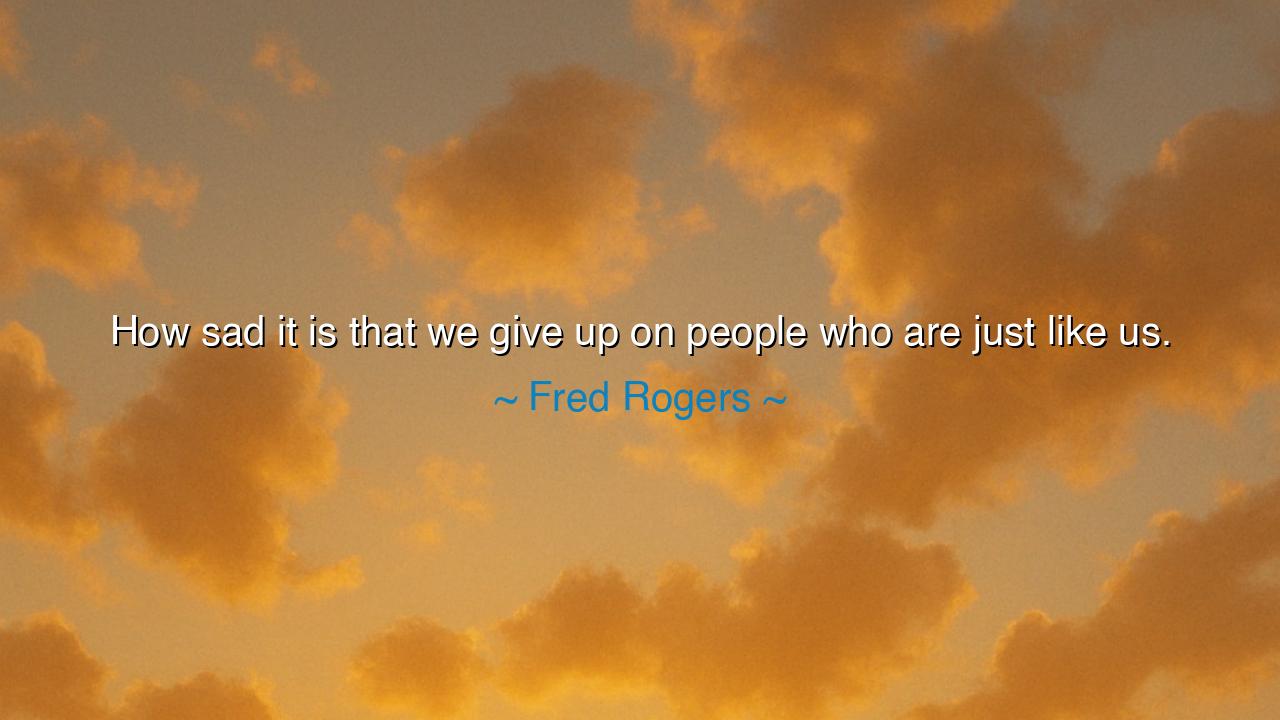
How sad it is that we give up on people who are just like us.






In the gentle yet piercing words of Fred Rogers, a man who spent his life teaching compassion through simplicity, we find a lament that cuts deep into the heart of humanity: “How sad it is that we give up on people who are just like us.” This truth, spoken softly, carries the gravity of ages. It is not merely a comment on kindness — it is an indictment of our forgetfulness, a sorrow for how easily we abandon empathy. For in forgetting others, we forget ourselves. In closing our hearts to those who struggle, fail, or falter, we deny the very mirror of our own imperfection.
Fred Rogers, known to many simply as Mister Rogers, was a man of quiet strength — not a warrior in the world’s sense, but one who fought the invisible battles of the soul. His words arose not from bitterness, but from heartbreak at witnessing division where understanding might have bloomed. He saw a world that celebrated love in theory, yet practiced judgment in action. His lament, then, was for all the broken bonds of humanity — for every friend cast aside, every stranger ignored, every outcast left behind. His quote reminds us that the distance we place between ourselves and others is an illusion, born of fear, pride, or indifference.
The ancients would have recognized the truth in Rogers’ words. The philosopher Marcus Aurelius, emperor of Rome and student of the soul, once wrote, “Men exist for the sake of one another. Teach them or bear with them.” He knew, as Rogers did, that the human heart is not divided by nature but by choice. To give up on another is to sever the golden thread that binds all living souls. We are, each of us, reflections of one another’s hopes and frailties — different only in circumstance, not in essence. The wise see in the fallen not a stranger, but a brother who stumbled on the same road they themselves might one day walk.
Consider the story of Nelson Mandela, imprisoned for twenty-seven years under a regime built on hate. When he was finally freed, he did not rise to curse his captors or seek vengeance. Instead, he chose forgiveness, saying, “Resentment is like drinking poison and waiting for your enemy to die.” Mandela refused to give up on his oppressors, recognizing that they, too, were human beings lost in ignorance. His mercy became the seed of a nation’s rebirth. This is the power of seeing others as “just like us” — the power to heal what hatred divides, to build bridges where bitterness would build walls.
Fred Rogers’ sorrow, then, is not merely for those we reject, but for the loss within ourselves that such rejection causes. When we give up on others, our hearts grow smaller. Compassion is not a gift we give to the worthy — it is a practice that keeps our souls alive. Rogers, a man who spoke to children but taught the world, understood that empathy is not weakness but the highest form of wisdom. To see another person, truly see them — their pain, their fear, their longing to be loved — is to awaken the divine within oneself.
And yet, how often do we fail in this? How often do we turn away from those who are wounded, inconvenient, or misunderstood? We excuse our indifference by saying, “They are different.” But Rogers unmasks this illusion with one simple truth: they are just like us. They, too, have known loneliness, have yearned for love, have made mistakes they wish to undo. To abandon them is to abandon the very humanity we share. As the ancients taught, “The stranger at your gate is the god in disguise.” In every person we reject, we reject a part of ourselves.
So what lesson, then, shall we carry forward? It is this: Do not give up on one another. When you see someone faltering, remember your own moments of weakness. When you encounter anger, look for the hurt beneath it. When others push you away, do not meet them with contempt, but with patience — for there was a time when you, too, needed someone to believe in you. This is the sacred discipline of compassion: to love not only when it is easy, but when it costs us something.
In the end, Fred Rogers’ words call us to remember what it means to be human. To live with open hands instead of clenched fists. To see ourselves not as islands, but as parts of the same vast and fragile whole. The sadness he spoke of is still with us, but so is the remedy: the choice to understand instead of condemn, to hope instead of despair, to reach instead of retreat. For when we choose empathy over apathy, we rediscover what the ancients already knew — that the greatest act of love is not in helping the perfect, but in never giving up on those who are, in truth, no different from ourselves.






AAdministratorAdministrator
Welcome, honored guests. Please leave a comment, we will respond soon